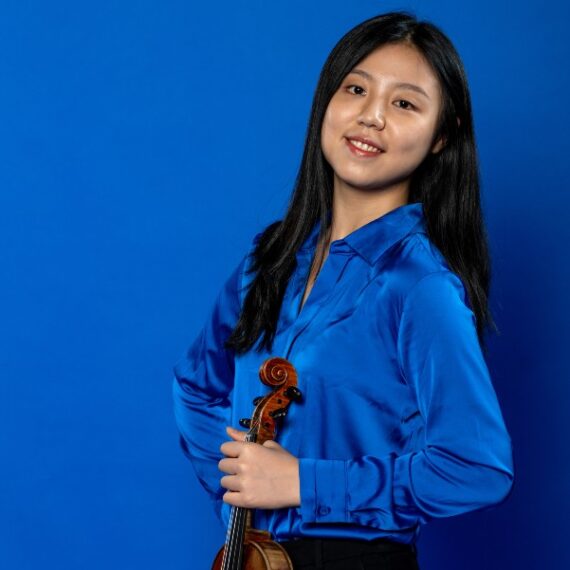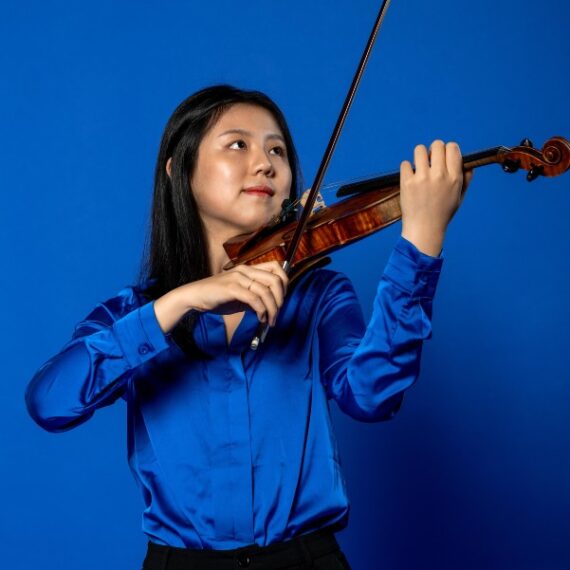Awards/Competitions
Finalist, 2014 CCTV China National Violin Competition; 2nd Place, 2018 China Youth Music Competition Hummingbird Music Award; 2nd Place, 2021 Peabody Institute Marbury Violin Competition; 2023 Peabody Institute J.C. Van Hulsteyn Award
Appearances
China Youth Chamber Orchestra and China Youth Philharmonic Orchestra, concertmaster, 2014–19; Peabody Symphony Orchestra, co-concertmaster, 2019–24; Summit Music Festival, 2019; NYO-China, co-concertmaster, 2017, 2019; 1st Anniversary Festival of Pyeongchang Winter Olympics, South Korea, 2019
What is your earliest memory of classical music?
My love for music began in childhood when my mom would play a variety of old recordings, including Tchaikovsky’s Violin Concerto in D major. I was captivated by the melody—it touched me so deeply that I begged my mom to play this recording repeatedly, and even made it my alarm to wake me up each morning. Those moments really sparked my passion for classical music, and ever since, I’ve always been driven to create the same emotional impact in my own performances.
Was there a teacher who was particularly impactful/helpful? What made this instructor stand out?
My violin teacher in college really shaped my musical path and brought me to TŌN. Like many other young musicians, I was eager to play in competitions, win prizes, and showcase my talent, because I believed that success in competitions was the strong proof of a great musician. But my teacher saw things differently, and she was the person guiding me to ask me: Why do I want to be a musician? What do I truly want to do as a musician? She told me that making great music was not about winning prizes or proving myself—it was about staying patient, humble, and dedicated in the lifelong process of learning music and improving my music making. Her words have stayed with me, reminding me to give myself fully to the music.
How did you hear about TŌN? What inspired you to apply?
I first heard about TŌN through some friends and fellow musicians who spoke highly of the experience it offers. What really drew me to apply was TŌN‘s mission focusing on “training young music professionals to become creative ambassadors of classical music“ and making music more accessible to modern audiences in various performance venues. I was inspired by the chance to grow not just as a performer, but as a teaching artist who can make a meaningful contribution to the future of music.
How would you like to see orchestra concerts evolve in the future?
I would love to see orchestra concerts evolve in innovative ways that present music in more engaging and resonating ways to audiences, maybe through collaborations with other artists, interactive sessions with audiences, or multimedia experiences that can bridge the gap between the tradition and young generations of audiences.
If you weren’t a musician, what would you be doing?
I think I would still want to be in an arts field, like painting. Just like music, painting allows for emotional expression and creativity. I‘ve always been fascinated by nuances of colors, textures, and brush strokes that can evoke feelings in much the same way that music does. Or I think I might pursue being an athlete. Sports not only require physical abilities, but also mental aspects like strategy and focus. It is similar to music-making in that a musician needs to stay mentally sharp under pressure and have a constant yearning and patience to improve oneself. Both are not because of my parents‘ careers or expectations, but rather my own interest and self-expectation to better myself in all aspects of life.
What is the biggest challenge and/or surprise about playing in an orchestra?
One of the biggest challenges about playing in an orchestra is the multitasking required. As an orchestral musician, you are not just focused on playing your own part; you also need to stay with the conductor and even follow and lead the orchestra if you are a principal player. You also need to stay aware of the entire orchestra and respond quickly to make adjustments. It takes great concentration and the ability to be flexible. It‘s complex, but a fun part of orchestra playing.
What advice would you give your younger self or anyone starting out?
I would suggest to my younger self or anyone starting out to have a strong mindset and step up to challenges without fear. Challenges are just the natural part of any journey, and how you handle them is crucial. You will overcome them and grow stronger eventually.



